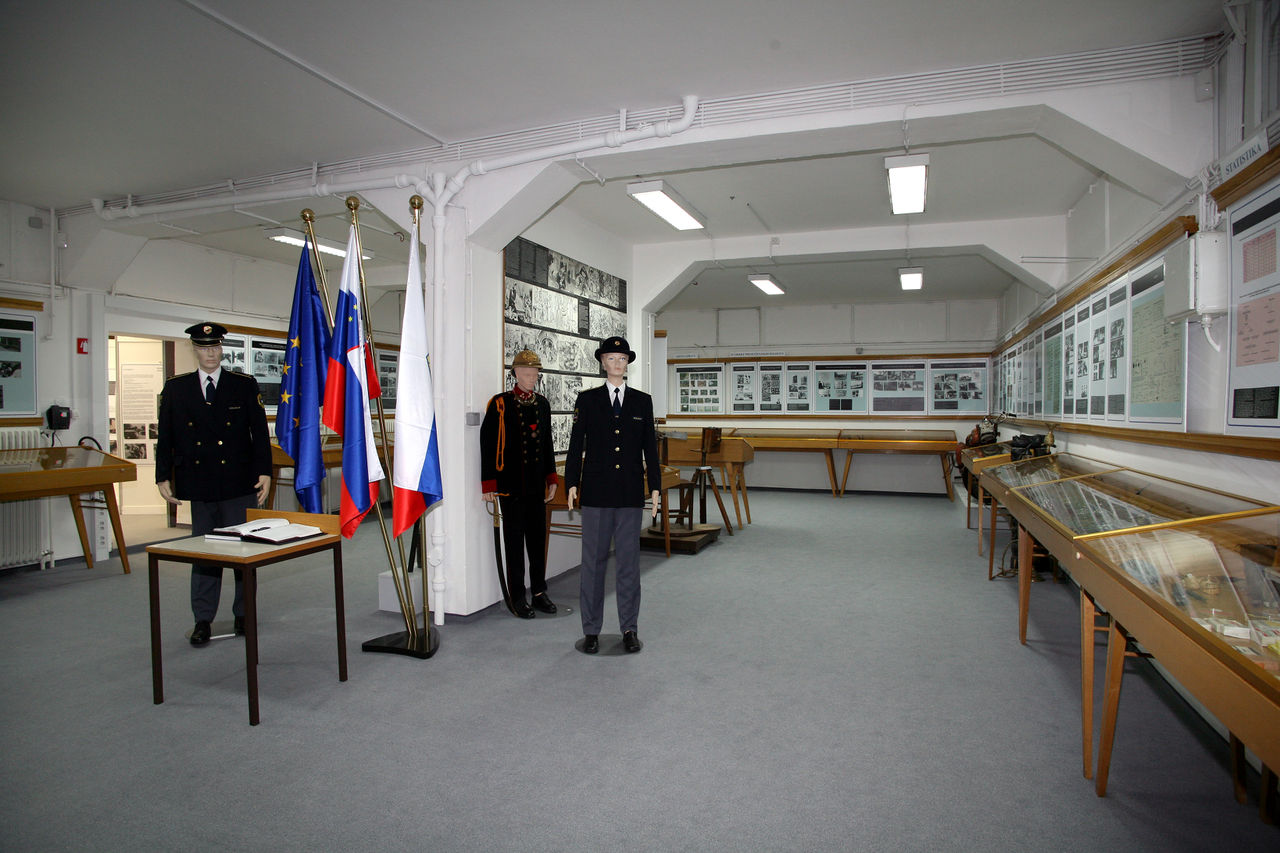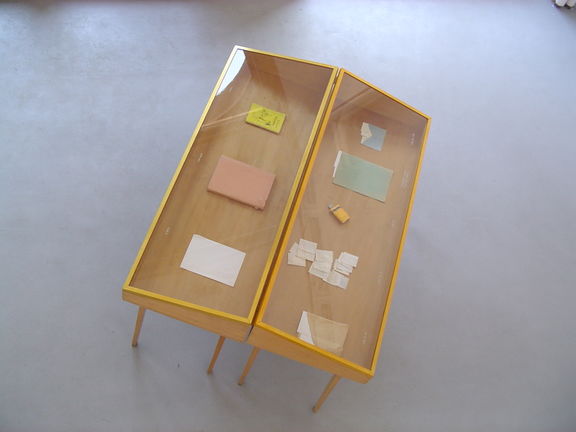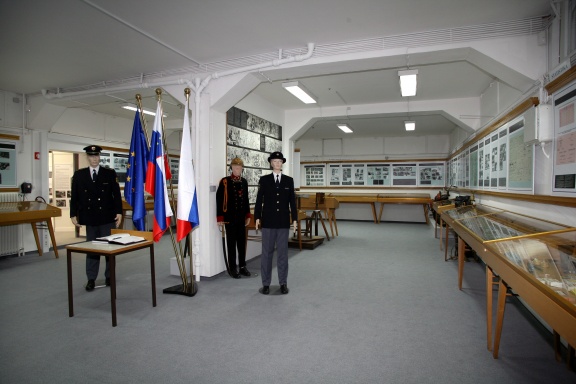Difference between revisions of "Museum of Slovene Police"
m (→External links) |
(minor update) |
||
| (9 intermediate revisions by 4 users not shown) | |||
| Line 1: | Line 1: | ||
{{Article | {{Article | ||
| − | | status = | + | | status = PHOTO |
| maintainer = Admin | | maintainer = Admin | ||
}} | }} | ||
| − | + | ||
{{Infobox | {{Infobox | ||
| name = Museum of Slovene Police | | name = Museum of Slovene Police | ||
| − | | | + | | logo = |
| local name = Muzej slovenske policije | | local name = Muzej slovenske policije | ||
| street = Rocenska ulica 56 | | street = Rocenska ulica 56 | ||
| town = SI-1211 Ljubljana Šmartno | | town = SI-1211 Ljubljana Šmartno | ||
| − | | telephone = | + | | telephone = 386 (0) 1 428 4216 |
| fax = 386 (0) 1 428 5689 | | fax = 386 (0) 1 428 5689 | ||
| − | | email = | + | | email = muzej@policija.si |
| − | | website = http://www.policija.si | + | | website = http://www.policija.si/index.php/component/content/article/251-kje-smo/7863-muzej-slovenske-policije |
| founded by = Ministry of the Interior | | founded by = Ministry of the Interior | ||
| contacts = {{Contact | | contacts = {{Contact | ||
| − | | name = | + | | name = Darinka Kolar Osvald |
| role = Curator | | role = Curator | ||
| telephone = | | telephone = | ||
| fax = | | fax = | ||
| − | | email = | + | | email = darinka.kolar.osvald@policija.si |
}} | }} | ||
| opening hours = By appointment, 8am-3pm Mon-Fri | | opening hours = By appointment, 8am-3pm Mon-Fri | ||
| Line 26: | Line 26: | ||
{{Teaser| | {{Teaser| | ||
| − | The history of the [[Museum of Slovene Police]] dates back to the year [[established::1920]]. | + | The history of the [[Museum of Slovene Police]] dates back to the year [[established::1920]]. In 1971 its first professional curator, art historian [[Biserka Debeljak]] developed an intriguing display based on the methodologies of dealing with different aspects of crime in the society. Thus the museum is often considered as the Museum of Criminalistics. The Museum of Slovene Police is a member of the [[Association of Slovene Museums]]. |
| + | |||
| + | {{Wide image|Museum of Slovene Police.jpg}} | ||
}} | }} | ||
| Line 32: | Line 34: | ||
After World War I, documentation on criminal acts on the territory of Slovenia was collected in the old military barracks in Šempeter, Ljubljana. Later the collection was transferred to various locations and since 1970 the so-called Museum of Internal Organisation – Criminal Collection was housed at the Police Secondary School in Tacen, Ljubljana. | After World War I, documentation on criminal acts on the territory of Slovenia was collected in the old military barracks in Šempeter, Ljubljana. Later the collection was transferred to various locations and since 1970 the so-called Museum of Internal Organisation – Criminal Collection was housed at the Police Secondary School in Tacen, Ljubljana. | ||
| − | In 2001 a Police Academy was established, and as space was initially at a premium the museum was temporarily closed. However, in December 2006, the museum collections were finally allocated a space within the academy and can now be visited by appointment. In this transition period the curator collaborated with the artist [[Alenka Pirman]] on the methodological contemporary art exhibition ''The Case. Art and Criminality'' at [[Mala Gallery | + | In 2001 a Police Academy was established, and as space was initially at a premium the museum was temporarily closed. However, in December 2006, the museum collections were finally allocated a space within the academy and can now be visited by appointment. In this transition period the curator collaborated with the artist [[Alenka Pirman]] on the methodological contemporary art exhibition ''The Case. Art and Criminality'' at [[Mala Gallery]] in 2005. |
In 2006 the Ministry of the Interior also published a thorough monography ''The Museum of the Internal Affairs Agencies – A Catalogue and Notes on the History of the Museum, Its Objects and the People Who Created It'' (in Slovenian). | In 2006 the Ministry of the Interior also published a thorough monography ''The Museum of the Internal Affairs Agencies – A Catalogue and Notes on the History of the Museum, Its Objects and the People Who Created It'' (in Slovenian). | ||
==Collections== | ==Collections== | ||
| − | The collections | + | The collections fulfill an important educational function and raise the awareness on crime prevention; its target audience includes students of criminal and social sciences, law students, doctors, ethnologists, social workers, and defectologists as well as the general public. |
The collections have been divided into the following sections: | The collections have been divided into the following sections: | ||
| − | * Homicides and sexual criminal | + | * Homicides and sexual criminal offenses |
* Crimes against property | * Crimes against property | ||
* Illicit drugs | * Illicit drugs | ||
* Juvenile delinquency | * Juvenile delinquency | ||
* Economic crime | * Economic crime | ||
| − | * Criminal | + | * Criminal offenses related to the safety of the state and its constitutional system (formerly Political crime) |
* Execution of penal sanctions | * Execution of penal sanctions | ||
* Presentation of the Forensic investigation centre | * Presentation of the Forensic investigation centre | ||
| Line 51: | Line 53: | ||
==See also== | ==See also== | ||
* [[Association of Slovene Museums]] | * [[Association of Slovene Museums]] | ||
| + | *[[Police Orchestra]] | ||
==External links== | ==External links== | ||
| − | * [http://www.policija.si/index.php/ | + | * [http://www.policija.si/index.php/component/content/article/251-kje-smo/7863-muzej-slovenske-policije Police Museum web page on the Ministry of the Interior website] (in Slovenian) |
* [http://www.policija.si/index.php/component/content/article/279-fotogalerija/7881-fotogalerija Police Museum photo gallery on the Ministry of the Interior website] | * [http://www.policija.si/index.php/component/content/article/279-fotogalerija/7881-fotogalerija Police Museum photo gallery on the Ministry of the Interior website] | ||
* [http://www.policija.si/images/stories/Publikacije/PDF/muzej.pdf The Police Museum monography] (2006, pdf) | * [http://www.policija.si/images/stories/Publikacije/PDF/muzej.pdf The Police Museum monography] (2006, pdf) | ||
| + | |||
| + | {{gallery}} | ||
[[Category:Museums]] | [[Category:Museums]] | ||
| − | |||
[[Category:Specialised museums]] | [[Category:Specialised museums]] | ||
Latest revision as of 20:12, 11 December 2019
History
After World War I, documentation on criminal acts on the territory of Slovenia was collected in the old military barracks in Šempeter, Ljubljana. Later the collection was transferred to various locations and since 1970 the so-called Museum of Internal Organisation – Criminal Collection was housed at the Police Secondary School in Tacen, Ljubljana.
In 2001 a Police Academy was established, and as space was initially at a premium the museum was temporarily closed. However, in December 2006, the museum collections were finally allocated a space within the academy and can now be visited by appointment. In this transition period the curator collaborated with the artist Alenka Pirman on the methodological contemporary art exhibition The Case. Art and Criminality at Mala Gallery in 2005.
In 2006 the Ministry of the Interior also published a thorough monography The Museum of the Internal Affairs Agencies – A Catalogue and Notes on the History of the Museum, Its Objects and the People Who Created It (in Slovenian).
Collections
The collections fulfill an important educational function and raise the awareness on crime prevention; its target audience includes students of criminal and social sciences, law students, doctors, ethnologists, social workers, and defectologists as well as the general public. The collections have been divided into the following sections:
- Homicides and sexual criminal offenses
- Crimes against property
- Illicit drugs
- Juvenile delinquency
- Economic crime
- Criminal offenses related to the safety of the state and its constitutional system (formerly Political crime)
- Execution of penal sanctions
- Presentation of the Forensic investigation centre
See also
External links
- Police Museum web page on the Ministry of the Interior website (in Slovenian)
- Police Museum photo gallery on the Ministry of the Interior website
- The Police Museum monography (2006, pdf)





